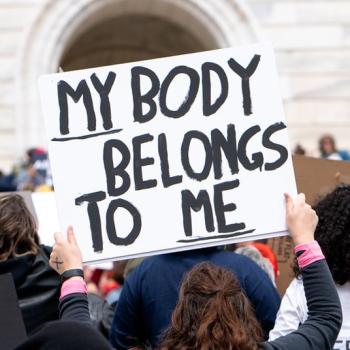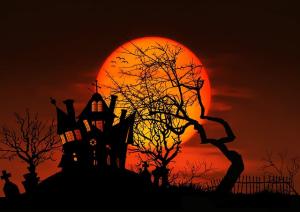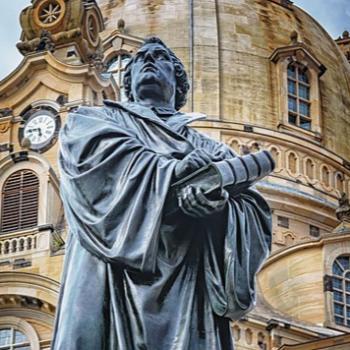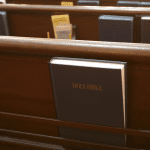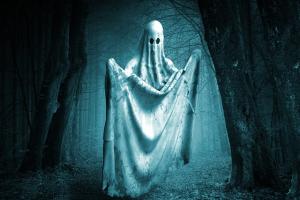
It’s almost Halloween, and Americans are decorating their yards with ghosts, ghouls and goblins, planning costume parties and loading up on candy. It’s the perfect time to talk about ghosts. So, let me begin with an obvious question: do you believe in ghosts? I mean actual apparitions of dead people… disembodied spirits… translucent entities that roam the land and scare the living.
A Haunting in Tennessee
I haven’t believed in actual ghosts since I was about seven or eight years old. My feelings about them changed the summer my best friend and I decided we were too grown-up to play with my little sister. With nothing better to do, we concocted a mean trick to play on her.
The favorite play area for all three of us was the basement, which was filled with toys. It was a perfect playroom except for one problem. It was haunted. Not the entire basement, mind you. Just the back room where two large, creepy oil paintings rested against one of the walls.
Each dust-covered painting featured the image of a long-dead male relative dressed in 19th century clothing. The portraits smelled like death – or at least how I thought death smelled – and their eyes followed us everywhere we went in the room.
The eyes were the main reason the room was haunted.
My friend and I knew the paintings needed to go, but Mother wouldn’t get rid of them and all Dad said was, “Go ask your mother.”
Finally, my friend and I found some old blankets in a cedar chest and covered the men’s faces. We knew the eyes were still watching our every move, but hiding the faces helped.
The Plot Thickens
The paintings gave my friend and me an idea one day when the two of us were alone in the backyard. We started talking about how the men in the paintings haunted the basement and how their eyes followed us while we played.
What if we shared our scary stories with my sister? What if we made them even scarier? What if my sister became too scared to follow us downstairs?
My friend and I agreed on the details of our plan, and I invited my sister downstairs to play. Meanwhile, my friend hid in the back room with the portraits and made noises that I attributed to ghosts.
It wasn’t hard to scare a four-year-old, and our plot quickly moved to its conclusion. My friend, covered in a sheet, jumped from her hiding place and pulled the blankets off the two portraits.
That was my cue to run screaming from the basement with my scared little sister behind me. Did I mention it was a mean trick to play on a four-year-old?
At any rate, I screamed and ran out the screen door, as did my sister — and my friend was right behind us, which wasn’t supposed to happen.
By the time we stopped some distance from the basement door, all three of us were genuinely scared out of our wits. We couldn’t see through the screen door into the darkness of the basement, but we knew the ghosts and ghouls were there.
None of us set foot in the basement playhouse for quite a while. We gradually started using it again, but life was never the same.
Ghosts through the Ages
Ghost stories have been with us since ancient times. The “Epic of Gilgamesh,” a Mesopotamian tale from around 2,000 B.C., told about the King of Uruk, who hears a first-hand account of the afterlife from his dead friend’s spirit.
In the Old Testament, King Saul visited the so-called witch of Endor to ask that she contact the prophet Samuel’s spirit. The king wanted advice on defeating the Philistines, and the witch seemingly conjured up something, either real or imagined. But the “spirit” or whatever it was predicted doom for Saul.
In the New Testament, some of Christ’s disciples mistook Jesus for a ghost when he walked on water. And also in the New Testament, three apostles saw the ghosts of Moses and Elijah during the transfiguration of Christ.
Moving ahead several centuries to the Middle Ages, people decided that ghosts were earthbound spirits of dead people. A few centuries later, Shakespeare included ghosts in plays such as “Macbeth” and “Hamlet.”
More recently, several versions of “A Christmas Carol” by Charles Dickens appear on television in December and reruns of shows such as “Ghost Hunters” play throughout the year.
Christian Scripture, Churches & Ghosts
The King James Bible uses the word “ghost” more than 100 times, with many of the references referring to the Holy Ghost, which is part of the Trinity.
Scripture is quite clear about the occult:
Deuteronomy 18:10-12 (NLT) says “…do not let your people practice fortune-telling, or use sorcery, or interpret omens, or engage in witchcraft, or cast spells, or function as mediums or psychics, or call forth the spirits of the dead. Anyone who does these things is detestable to the Lord.”
And Leviticus 19:31 (NLT) tells us: “Do not defile yourselves by turning to mediums or to those who consult the spirits of the dead. I am the Lord your God.”
Protestants have various beliefs about the afterlife, but the people I know do not believe in ghosts. However, they do believe in other spiritual entities such as angels and demons.
So, what do Protestants say about the afterlife?
“Some believe in immediate presence with Christ, while others propose ‘soul sleep’ or various interpretations of the transition to afterlife,” according to the Patheos Religion Library. Learn more about Protestant beliefs on the subject here.
“In traditional Catholic understanding, the human retains individuality beyond death and goes on to experience one of three states of being: Heaven, purgatory or hell,” Patheos said.
“Catholics believe in life after death,” according to the Catholic Church, “but things get complicated when those departed spirits start creeping across your living room.”
I’m not Catholic and don’t pretend to understand the church’s teachings about ghosts and the afterlife. If you want to learn more, check out the Patheos Religion Library here, or go to one of the church’s websites, uscatholic.org, here.
The Spiritualist Movement
Regardless of Christianity’s teachings about the afterlife, some Christians became involved in the spiritualism movement around the time of the U.S. Civil War and World War I.
Spiritualists believed that dead people could interact with the living and often attempted to reach them through mediums. The wars contributed to the movement’s growth because of the many grieving families who wanted to reach dead loved ones.
“Modern spiritualism traces its beginnings to a series of apparently supernatural events at a farmhouse in Hydesville, N.Y., in 1848,” according to Britannica. The key word is “apparently.”
According to the story, the family living in the house was disturbed by unexplained loud knocks one night. One of the man’s daughters supposedly established contact with a spirit, who identified itself as a man who had been murdered in the house.
The incident spurred other people to sell their services as “mediums.” They claimed they could act as an intermediary between the living and the dead, and their seances became popular, especially in 1860s England and France. Mary Todd Lincoln was a believer and reportedly held seances in the White House to contact her dead sons in the early 1860s.
Church leaders proclaimed that spiritualism was witchcraft, according to Britannica. “Some churches regarded the practices of the spiritualists as part of the forbidden activity of necromancy (communication with the dead in order to learn the future.)
“A decree of the Holy Office of the Roman Catholic Church in 1898 condemned spiritualistic practices, though it approved of legitimate scientific investigation of related phenomena. Both Protestant and Catholic bodies released a steady stream of anti-spiritualist literature.”
Ghosts, A Famous Magician & An Equally Famous Author
Famed magician and escape artist Harry Houdini became a well-known opponent of spiritualism after his experience with a medium. He hired the woman to contact his late mother, and the medium claimed to receive a message. She wrote it down, and Houdini immediately knew it was fake because it was written in English, which Houdini’s mother did not understand.
Houdini was quite familiar with the tricks that mediums used to dupe customers, and it angered him. He was especially angry at fraudulent mediums who preyed on people grieving the loss of family members in World War I.
Oddly enough, one of those grieving people was Sir Arthur Conan Doyle, the creator of Sherlock Holmes. Doyle, whose son had died in the war, was friends with Houdini despite their differing opinions about spiritualism and ghosts. The author was a true believer, while Houdini said mediums were “human leeches.”
“This thing they call Spiritualism, wherein a medium intercommunicates with the dead, is fraud from start to finish,” Britannica quotes Houdini as saying.
Eventually, Houdini and Doyle argued about spiritualism and ended their friendship.
Do You Believe in Ghosts?
So, we get back to the question, “Do you believe in ghosts?” I don’t. I’ve never experienced an apparition, even though I slept in a supposedly haunted bedroom for several years. My grandchildren were adamant about ghosts haunting the room, but I never saw even a hint of a ghost.
I have always been able to explain away sounds that go bump in the night, and you don’t want to get me started on cold spots, disembodied footsteps and orbs.
Yet, if you are a believer, I’ll leave you to your beliefs. People seem to like the thrill of being frightened, which probably explains society’s affinity for horror movies and Halloween.
And speaking of Halloween, enjoy the holiday if you celebrate it. My children and grandchildren are past the age of trick or treating, which means I will turn off the porch light on Oct. 31 and watch a good non-scary movie or read a book in peace. Maybe I’ll even fix some popcorn.








